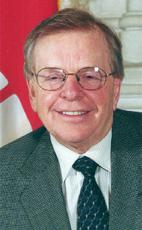Mr. Speaker, it goes without saying that all members of the House are deeply disturbed by recent events in the Middle East. As member's know, much of tonight's debate has been focused on our government's reaction to those events and the opposition's criticisms of the government's handling of a very difficult situation. That is as it should be.
However I would like to move away from the headlines and talk about Canada's assistance in the Middle East. It does not make great television pictures but it does go to the core of what we believe.
What do we believe? Canada believes that economic development and peace and security are mutually reinforcing. Two sides of the same coin, they have long been articulated Canadian foreign policy priorities. Many of the most horrific elements of the conflict unfolding daily in the Middle East bear the hallmarks of despair, whereas security and stability attract increased growth.
As trade and investment take root in a solid foundation and linkages across borders bind and fortify an entire region, political, social and cultural life can flourish. Nowhere have these principles been more relevant than in the Middle East. At no time have the economic costs of instability been more glaring than during the 18 months since the outbreak of the current intifada.
Canada's development assistance program in the Middle East countries of Jordan, Lebanon and Palestinian territories reflects the mutual reinforcement of poverty reduction and peace and security. Aimed broadly in support of the Middle East peace process, Canada's program has focused on Palestinian refugees both because they are the most needy communities and in order to complement Canada's role as gavel holder for the multilateral refugee working group.
Two initiatives of particular note are the Canada camp project and the Lebanese scholarship program. The Canada camp project was a successful family reunification program that brought 5,000 refugees back to Gaza after they had been trapped in Sinai when Egypt and Israel made peace in 1978. This involved co-ordinating the efforts of the governments of Israel and Egypt, UNRWA and the Palestinian authority. Canada's leadership not only facilitated a delicate and intricate exercise in co-operation but was successful in leveraging a critical contribution of supporting funds from Kuwait.
In Lebanon, Canada has played a similar role in mobilizing international funding, this time in support of Palestinian women refugees seeking university educations to build a more secure and prosperous future for themselves and their families. At present, 58 young women from difficult economic circumstances are pursuing university studies and we hope that more than double this number happens in the years ahead.
Canadian development programming in the region seeks to create an enabling environment for sustainable development, itself a prerequisite for peace and prosperity. To accomplish that, capacity building of both state and civil society institutions has become a primary goal.
In Jordan, Canada has been a leader in helping to reform the national vocational education system, in particular utilizing Internet communications technology to help create better employment opportunities for young Jordanian graduates.
In Lebanon, economic development has been tackled head on through a capacity building and technology upgrading program with the minister of revenue there. More revenues are being collected more fairly and transparently, building confidence in the public and allowing the government the needed resources to accomplish other social priorities.
Equity issues of access to education and employment opportunity have been addressed in CIDA's Egypt program through focusing on girl child education and small enterprise development.
In the Palestinian territories, we have worked actively with municipalities to improve their planning and governance capacities. The intifada and its accompanying violence has all but halted long term development strategies. Earlier, Canadian efforts to build state institutions responsible for democratic elections, social welfare and environmental protection have been put on hold for now as attention has been redirected to the humanitarian crisis the local population is facing.
As part of its effort to promote better understanding of complex contemporary issues, Canada has funded the creation of the world's first human security centre in Amman, Jordan. The centre provides a venue where serious study of human security issues can take place and provides a venue for their discussion and dissemination. We are hopeful that the Amman human security centre will evolve into a facility to promote the kind of neutral respect and understanding that is so desperately needed in the Middle East today.
Given our half century's history of involvement in efforts to resolve and mitigate the consequences of the longstanding conflict in the Middle East, Canada has a stake in bringing the disastrous phase we are now witnessing to a quick end.
Conflict cannot be resolved through violence. The only path to the peace that the people of the region and the people of Canada crave is through negotiation. Building on the experience we have gained over five decades of involvement we will continue to work for an end to violence, a return to negotiations and for a just and lasting peace.

